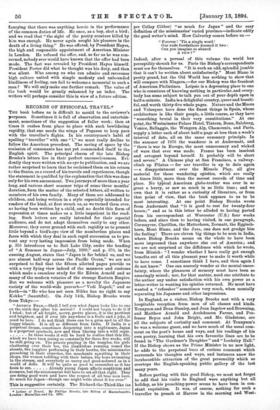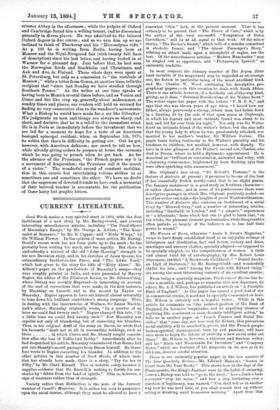RECORDS OF EPISCOPAL TRAVEL.* 'THE book before us is difficult
to mould to the reviewer's purposes. Sometimes it is full of observation and entertain- ment, sometimes of the suggestion of fuller work; then at times it rushes from place to place with such bewildering rapidity, that one needs the wings of Pegasus to keep pace with the traveller's flights. In his countrymen's habit of spelling "traveller" with one "1," we must really decline to follow the American precedent. The saving of space by the omission of consonants has not yet commended itself to the English spirit. The principal charm of the late Bishop Brooks's letters lies in their perfect unconsciousness. Evi- -dently they were written with no eye to publication, and we are rather surprised to learn that he reclaimed them on his return to the States, as a record of his travels and experiences, though the statement is qualified by the explanation that this was done -only for his own amusement. Two journeys of more than a year long, and various short summer trips of some three months' duration, form the matter of the selected letters, all written to members of his own family. Many of them are addressed to -children, and being written in a style especially intended for readers of the kind, at first struck us, as we turned them over, -as having been written by a child, and no doubt this form of expression at times makes us a little impatient in the read- ing. Such letters are really intended for their especial audience, and do not adapt themselves easily to any other. Moreover, they cover ground with such rapidity as to present little beyond a bird's-eye view of the numberless places and laces with which they deal in such rapid succession as to pre- vent any very lasting impression from being made. When p. 355 introduces us to Salt Lake City, under the heading of "A Summer in Japan—July, 1889," and p. 370, in the ensuing August, states that "Japan is far behind us, and we -are almost half-way across the Pacific Ocean," we are not -surprised to find that the fifteen allotted pages provide us with a very flying view indeed of the manners and customs which make a ceaseless study for Sir Edwin Arnold and so many of the modern votaries of the strange Eastern Empire. But we welcome with pleasure as a novelty the Japanese variety of the world-wide proverb—" Vedi Napoli," and so forth—in "He who has not seen Nikko has no right to say Kekko " (beautiful). On July 14th, Bishop Brooks wrote from Tokyo
" Alma-us DEAR,—Shall I tell you what Japan looks like to one on the sixth day after his arrival ? I could not begin to do it if I tried ; but of all bright, merry, pretty places, it is the prettiest and brightest, and if ever life anywhere is a frolic and a joke, it must be here. I do not think there can be a grim spot in all the happy islands. It is all so different from India. If India is a perpetual dream, sometimes deepening into a nightmare, Japan is a perpetual spectacle, now and then blazing into a wild orgie.
In three weeks it will be hard to realise that this life, which we have been seeing so constantly for these five weeks, will le still going on. The priests praying in the temples, the girls 'chattering over their tea, the jinxikishas running round the streets, the jugglers performing in their booths, the missionaries preaching in their churches, the merchants squatting in their shops, the women toddling with their babies, the boys swimming in the stream, and everybody as merry and good-natured as in a world of dolls. It will be quite as good to remember as it has been to see Already young Japan affects scepticism and trousers, but the missionaries will have to set all that right. They are doing good work and have the respect of all true men here. Bo much for Japan—though one might write about it for ever."
This is suggestive certainly. The Richard-the-Third-like (as
• Lettere of Travel. By Phillips Brooks, late Bishop of Measachusetts. London : Macmillan and Co. BM.
per Colley Cibber) "so much for Japan" and the easy definition of the missionaries' varied province—indicate oddly the good writer's mind. How Calverley comes before us :— " Forever ! 'Tis a single word !
Our rude forefathers deemed it two :
Can you imagine so absurd A view ?"
Indeed, after a perusal of this volume the world has perceptibly shrunk for us. Paris the Bishop's correspondents must see for themselves. "It is such an odd, splendid jumble that it can't be written about satisfactorily." Mont Blanc is pretty grand, but the Old World has nothing to show that will compare with Niagara ;—for our Bishop was the frankest of American Philistines. Leipsic is a depressing place to one who is conscious of knowing nothing in particular, and every- body has some subject to talk you out of your depth upon in half-a-minute. India is a delightful country, queer and beauti- ful, and worth thirty-five whole pages. Nature and the Moors and Velasquez have done the finest things in Spain, whose architecture is like their people, a little coarse, as they have "something brutal in their very constitutions." At one point, the Westminster Palace Hotel, Tintern, Bonn, Salzburg, Venice, Bellaggio, the Wengern Alp, Chamounix, and Paris, supply a letter each of about half-a-page at less than a week's interval of date, all on the same summary principle. In the summer of 1870 the wanderer is at Andermatt, and "there is war in Europe, the most unnecessary and wicked of wars that ever was made. France has been insolent
and arrogant beyond herself. It probably will be short and severe." A Chinese play at San Francisco, a railway- climb up Pilatus — for our traveller is up to date again — a disappointment over the Miracle Play, all give material for these wandering epistles, which are really at times little. more than the merest records of time and place. No typical American globe-trotter was ever in so great a hurry, or saw so much in so little time; and we own that it is rather as a curiosity of literature, or from that point of view, that the book appears to us to be
most interesting. At one point Bishop Brooks wrote from Andermatt that "it is good to rest for twenty-four hours ; " and as in this letter he alluded to having parted from his correspondent at Worcester (U.S.) four weeks before, and since then to having visited, in one paragraph, Cormayeur, Chatillon, the Matterhorn, Zermatt, the Eggisch- horn, Mont Blanc, and the Jura, one does not grudge him the feeling! There are eleven big things to be seen in India, where Bishop Brooks seems on the whole to have been more impressed than anywhere else out of America; and we are not surprised at the diffidence with which he wrote, from Munich : "I wonder whether I have really got enough benefits out of all this pleasant year to make it worth while to have come. I sometimes think I have, and then again I do not know." One can scarcely wonder at the mental uncer- tainty, where the pleasures of memory must have been so amazingly mixed ; nor, for that matter, need one attribute to the author any undue satisfaction with his own power as a letter-writer in wanting his epistles returned. He must have wanted a " refresher " sometimes very much, when mentally separating his Japanese and other impressions.
In England, as a visitor, Bishop Brooks met with a very hospitable reception from men of all classes and kinds.
Tennyson and Dean Stanley, and Jean Ingelow and Browning, and Matthew Arnold and Archdeacon Farrar, and Pro- fessor Bryce and John Bright, and Mr. Gladstone, are all the subjects of curiosity and comment. At Tennyson's he was a welcome guest, and we have much of the usual com-
ment on the poet's house and ways, and his readings of his own poetry, learning that his own favourite lines are to be found in "The Gardener's Daughter" and " Locksley Hall." If the Bishop shows as the Prime Minister in no new light, he adds to the perpetual buzz of curious comment which surrounds his thoughts and ways, and instances anew the inexhaustible attraction of the great personality which so overtops the English-speaking public gallery of the last many years.
Before parting with this good Bishop, we must not forget to add that his visits to England were anything but all holiday, as his preaching-power seems to have been in con- stant requisition. It was, of course, nothing for such a traveller to preach at Harrow in the morning and West- minster Abbey in the afternoon ; while the pulpits of Oxford and Cambridge found him a willing tenant, and he discoursed generally in divers places. He was admitted to the beloved Oxford degree in due course ; and as we sum him up we are inclined to think of Thackeray and his " Hierosolyma vidit." At p. 169 he is writing from Berlin, having been at Moscow and the Nijni-Novgorod fair (with twenty full lines of description) since his last letter, and having looked in at Warsaw for a pleasant day. Just before that, he had seen the Norwegian fiords and Stockholm and Christiania and Aak and Avo, in Finland. Three whole days were spent at St. Petersburg, but only as a concession to "the vestibule of Moscow ; " while a letter from Genoa, at another time, tells the recipient that "since last Sunday we have strolled through Southern France." As the writer at one time speaks of having been to Munich several times before, and as Venice and Como and the like crop up, generally about midsummer, at sundry times and places, our readers will hold us excused for finding no very consecutive clue to the wanderer's movements. What a Bishop he would have made for a see like Gibraltar! His judgments on men and things are always so sharp, and short, and decisive, that he is a relief to the inconstant mind. He is in Paris so immediately before the investment that we are led for a moment to hope for a taste of an American besieged episcopal resident, when, on September 5th, 1870, he writes that there is difficulty in getting out. Oat he got, however, with American deftness ; nor cared to tell us how, while already giving orders to prepare at home the sermons which he was going to preach when he got back. As for the advance of the Prussians, "the French papers say it is a movement of desperation ; the Prussians call it the march of a victor." The wonderful record of constant mobilisa- tion in this erratic but entertaining volume strikes us as sometimes one and sometimes the other. We have no doubt that the eagerness of devoted friends to have such a memorial of their beloved teacher is accountable for the publication of these hasty but graphic letters.







































 Previous page
Previous page